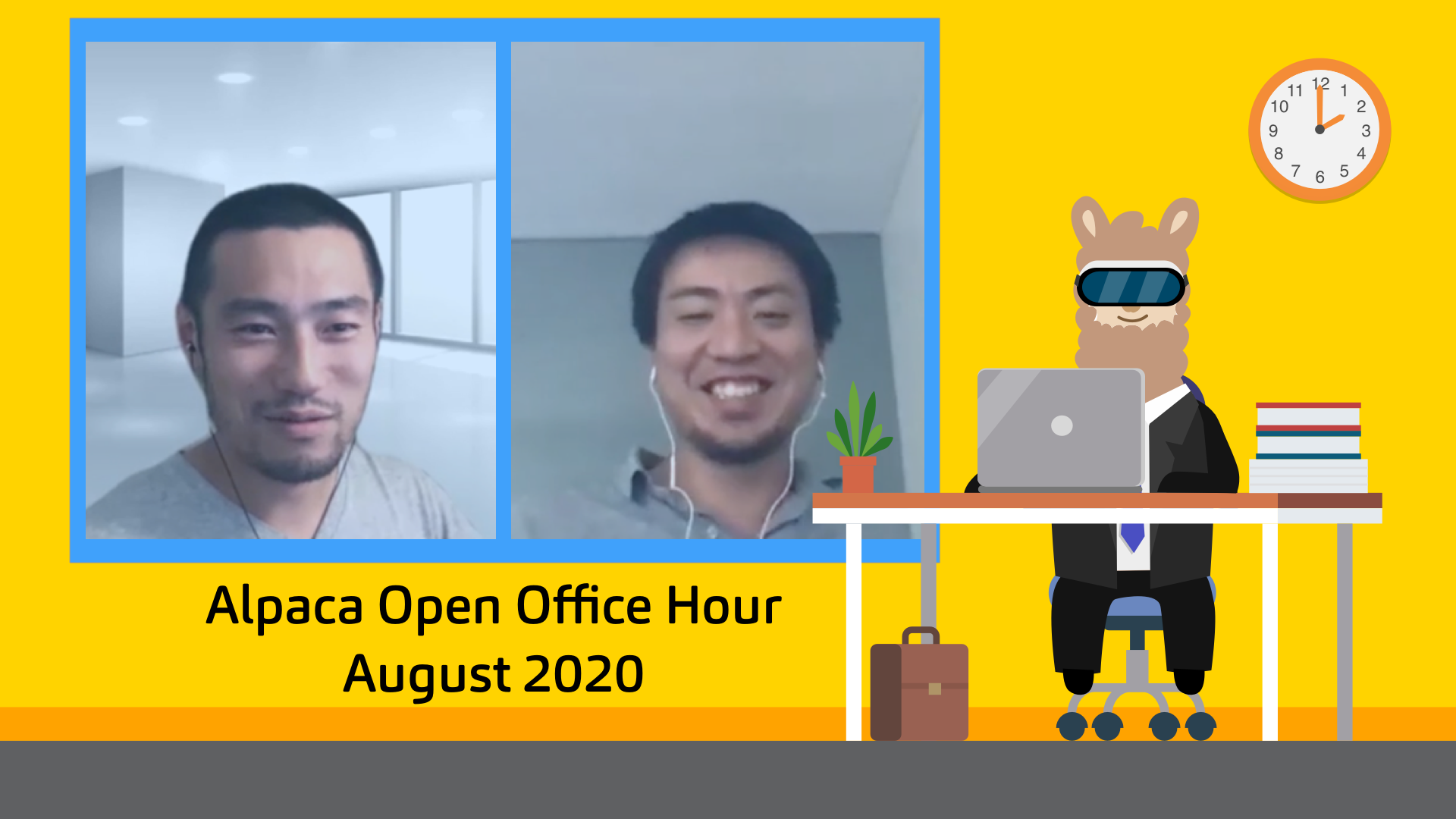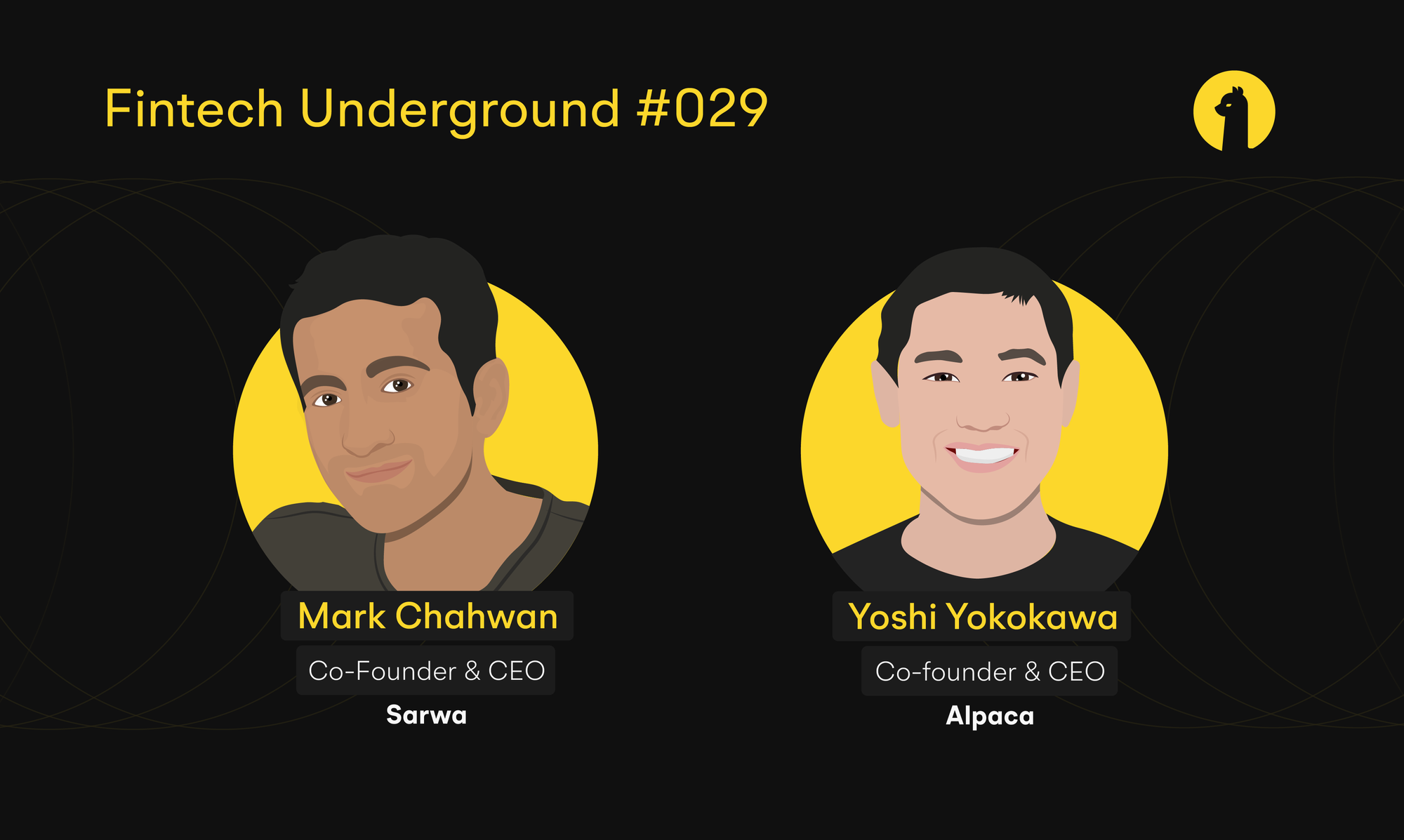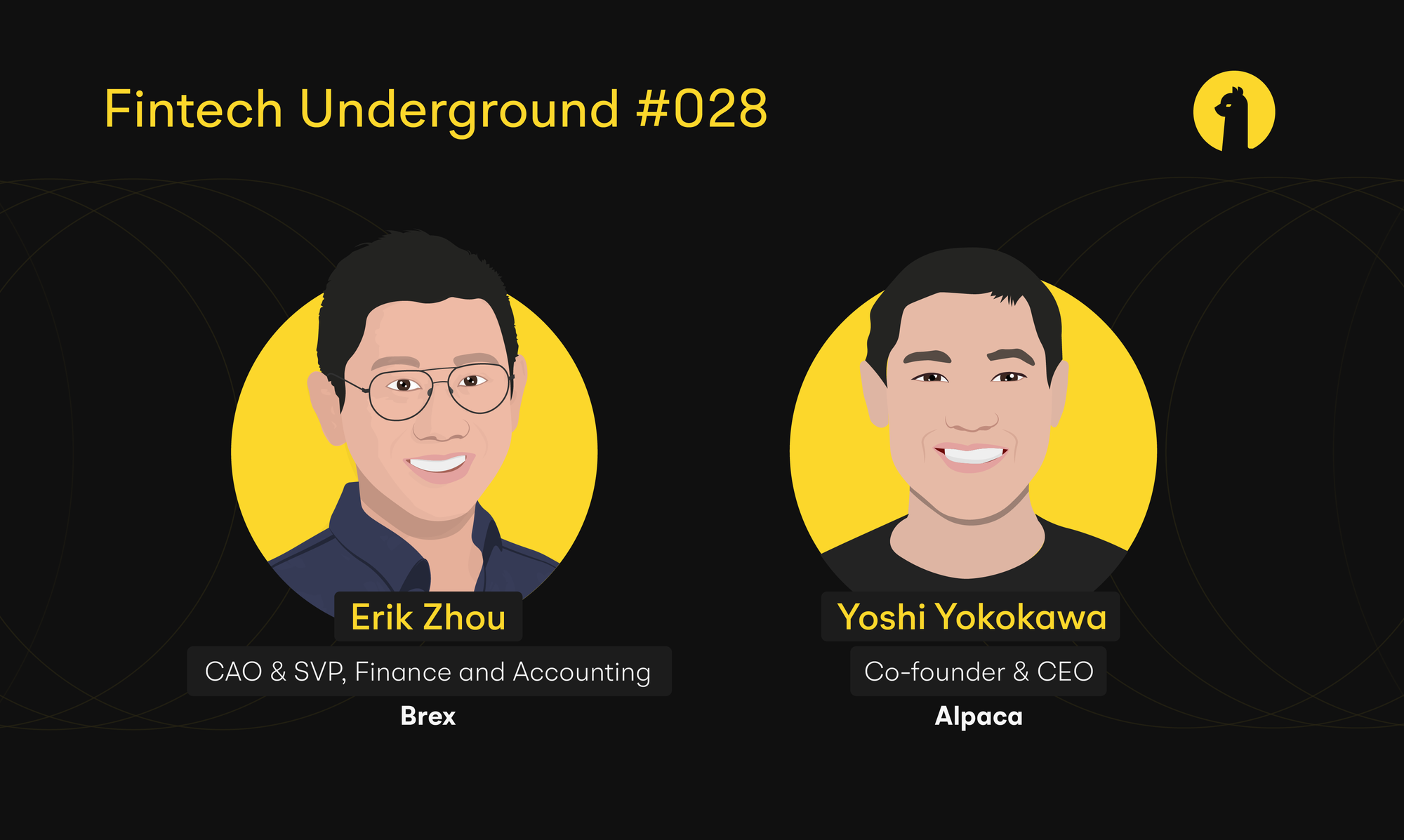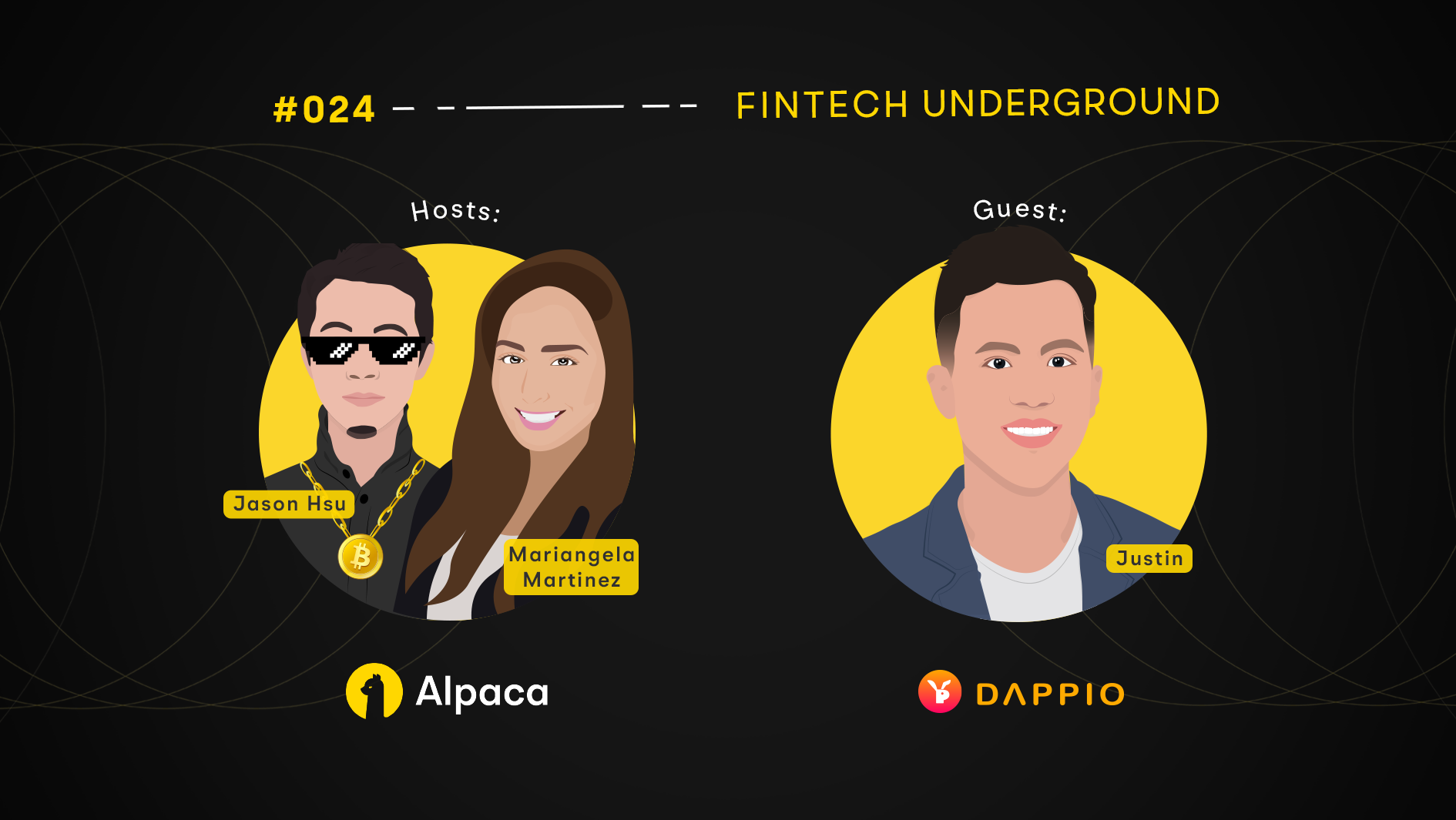
Alpaca's 1st Open Office Hour
We hosted the Alpaca 1st open office hour last week. We invited the community members for one-hour Zoom video chat where Alpaca's co-founders Yoshi and Hitoshi casually talked about the story, vision, and roadmap.
We plan to host these open office hours in the coming months as well. Please stay tuned for the next ones.
We are happy to share with you what we talked about during the office hour. Please see the transcript here!
Transcript of the Open Office Hour
Yoshi:
Hello everyone. Thank you very much for your time. Hello. Yeah, so my name is Yoshi. I'm the CEO, co-founder of Alpaca. And Hitoshi is also on the recording, he's a co-founder, CTO.
Hitoshi:
Yep, I'm Hitoshi. Nice to meet some of you guys.
Yoshi:
Yes, we've been communicating a lot over Slack. So Hitoshi and I, and also Etienne who has been coordinating this. Yeah, that's Etienne. He joined us a few months ago now, like four months, to do more of the business partnership development, all those things. So yeah, we're excited to do this office hour. The reason why that we decided to do this office hour and that we want to do this maybe hopefully every month or so with different types of the topics. But I feel that Alpaca as a product, we are very much supported by all of you.
Yoshi:
We are so very much supported by you on Slack and Forum and everywhere. And I want to really make sure that we show who we are. We are not like robot, we exist. And we want to bring up the answers to a bunch of the things that get popped up that has not been answered correctly. And I want to be as transparent as possible, providing the context, so that you know what we are working on. So that is a reason why we decided to do this office hour. Firstly, I’ll talk about Alpaca. What is the vision? How did we start? And after that, Hitoshi and I will go into some of the questions that we've received already.
Yoshi:
And I think it's going to take probably like 20, 30 minutes then we're going to open up for any Q&A. So you can chat any questions that you may have had. So with that said, firstly, I wanted to really explain about Alpaca. And first thing people always asked us, why the company's name is Alpaca? We want to start from there. Our company's origin is really... We started it in 2015 back then we were building deep learning prediction trading model for the banks and the trading firms for us to sell those algorithms. And what we've realized is that by doing so, we had to work with a bunch of the existing broker dealers that didn't have any APIs.
Yoshi:
As a tech company, it was a very, very painful process to do a business in that kind of field. So we realized that, okay, why don't we just create a broker dealer itself with the mindset that we should understand? We should be able to understand the pain point of the developers and the tech people then build something that solves the pain point in the broker dealer space. So that's really the reason why we started it. And the name Alpaca… Hitoshi has been in the Bay area for, I don't know, eight years or almost 10 years now. And I, myself came here probably like three, four years ago. We were driving around this area called Woodside where Steve jobs used to live and the Mark Zuckerberg, and those rich people live. And we saw this humongous house where they had the alpacas as pets in their yard. So okay, we realized the alpaca should be the symbol of the success in a tech company. So we decided to name the company as Alpaca. So that is really the reason why we are calling ourselves as Alpaca and it has nothing to do with the finance or trading or tech. So we think it's cute, I hope it's memorable by you, so that's how we decided to name Alpaca.
Hitoshi:
Good feedback from everyone in the chat.
Yoshi:
Okay, great. Thank you. So the vision of alpaca. So we, of course started as a young company, as a tech company. We launched our Alpaca broker dealer product end of 2018. So we are here only less than two years, one and a half year. So there are a lot of things that we are working on and where we want to get to. So I want to explain a little bit about endgame, where we are targeting. So our end game is really to build the tech friendly broker dealer... I wouldn't say tech friendly because tech friendly is common sense, but the common sense doesn't really exist in this broker dealer space. So we're basically building the normal company in this broker dealer, stock trading or any type of financial services space.
Yoshi:
We always look at what the interactive brokers are offering, in a sense. And at the same time we look at how we can be good in terms of the documentation and tech offering like Stripe or like even Plaid. Those are the companies that we look at as how we can be better, how we can be good as a tech company. But at the same time industry wise, it is true that we are in the stock broker space and online trading space. So we do look at how we can be the future version of what the interactive broker has been offering. So that's something that we always look at and how can we bring that kind of product out there as a company, like Stripe did in terms of the very much developer-oriented focus.
Yoshi:
So that's kind of a vision, but at the end of the day, what we want to offer is an API infrastructure that enables access to lots of financial assets. I think API is very powerful in trading space, and API can be used for, for example, algorithmic trading, but at the same time, that can be used to start hedge funds using trading algorithms and also can be used to build applications on top of the API. So there are many ways an API can be used. So our vision is really bringing many different type of the financial asset classes, not only the US stocks, through API. And eventually we want to have this one consolidated API that you need to only connect so that you can have access to bunch of the asset classes with ease. And this is a very big vision that we have, but that's something that we are targeting. And we are planning to do a lot more and more and more things in coming months and coming years. So that's something that we're trying to go as Alpaca.
Yoshi:
So that's kind of the background of who we are. And I want to go into to some of the questions that we've received before this call. Firstly, the quick recap of what we have been working on last three to six months, I think our main products that we have launched was some of the integrations. Obviously integration with other applications and services has been one of our important components to expand our available offerings indirectly to our users. So we launched the integration with this application called Blueshift. That's like Quantopian, in a way. It works as a Python-based backtesting cloud app just like Quantopian, and they connect to Alpaca’s live trading, you can do backtest and live-trade from there.
Yoshi:
They are also building new features. Still, it's not big, or not as established yet as Quantopian, but they are working on many cool features. There are also two other applications, the Arcade Trader, a very professional grade backtesting and analysis tool for high-end and very technical algorithmic trading. We have a Streak as well, which is also a well known app for no-code algorithmic traders. But these integration with applications are very key for us. So we keep pushing these integrations. And another big projects that we've been working on are, although on the invite-only, the non-US, international individual live trading accounts, as well as the business trading accounts.
Yoshi:
And also the business account as well. So we do accept business entities. So some traders users have LLCs, or C-Corp or LPs trading through Alpaca. And the reason why for that is some people got some money from friends and family investing those money or you want to make it big, like a hedge fund and starting that entity. And of course in order to open the business accounts as a regulated entity, we want to make sure that that is all correctly assessed. Who owns those business entities and those kind of stuff. So we do all those process. So it's not straight forward, or not very much automated process. So that's why for the business entity as well, we are currently having this $30,000 account minimum, so that we are making sure that we have a resource to be allocated to do those processing right now.
Yoshi:
And I think the second big question is when are you going to launch options, crypto, and other markets? So this is actually something that I really love to keep getting the feedback from all of you, what we should be adding. Options, yes. Crypto, yes. Maybe stock market in different countries like Europe, Asia, yes. So those are the things that we are really discussing internally and doing the research and trying to get as much feedback as possible. What is really used by our users and communities that basically help boost that excitement about getting involved with Alpaca. Options of course, that's more highly complex products, but I understand that.
Yoshi:
And we all understand that options may create pretty interesting applications as algorithms. So I think it's a good idea as well. Okay, crypto. I personally love crypto as well, but like in other companies, Coinbase or other exchanges also provide tech-friendly APIs as well. So what kind of value that can we create by us offering the crypto trading API? And that's something that I really want to hear from you. Is it really worth it for us to work on that, to provide those things? Maybe it's better to have the one API to do both crypto and US stock trading, even from as of right now, then that may be the answer. And those are the things that we're trying to figure out, in order to add what asset classes that we want to do as the very, very next thing.
Yoshi:
Of course, thinking about a couple of years down, that kind of duration, of course, those two asset classes will be added for sure. But I think the question that we always think about is short term, what we should be doing. Comparing to midterm, longterm vision of what eventually we need to be doing. So I don't think it's really the answer to the question about when are you going to launch options and crypto, but I hope you get my thought processing to you so that you kind of get where I'm coming from.
Yoshi:
And the next question is about paper trading. Can you share the difference between paper trading accounts and live trading? If I run my algorithm, will I get the same results? So this is also the questions that we received a lot. And an answer is, it is very different. How the market works is that, as you know, if you send in buy order or sell order, that does affect the supply and demand of how much of the stocks available for the bid and offer in the whole total market. So that does affect the whole pricing movement as well. But that's what's happening in the real world. For the paper trading, it's kind of impossible to duplicate what's happening in the real market in that level, because every time you have some order, that order is already fake because it's paper trading, so it's already not moving as the same way as the real life trading. We try our best to try to kind of make the hypothesis to create similar environments as much as possible.
Yoshi:
But that's a logical limitation that we have that we cannot overcome to make it exactly same between live and paper trading. And I think most of the differences probably come from those market impact. That has been the pretty key components. And Hitoshi, you can add if you think about any other key differences that you want to point out.
Hitoshi:
Yeah. Yeah. Some of the things are actually documented online, so I don't want to repeat myself again, but in a way that paper trading price is not as good as live trading, meaning that if you do experimentation that you run the exact same thing, sometimes you see that the paper trading is worse than live trading for those small spreads.
Yoshi:
Yeah. Yeah. I think it's the technical limits, and I personally comment such that, how can you actually simulate without risk? I was like, Hmm. So we often say that actually please try to put the real money, but with a small amounts so that you can kind of see if that's extremely different or, that's a little bit different kind of thing. So we believe that that is the only way to really, really kind of prove, at the end of the day, over your trading algorithms that if it's working or not. So that's I think for the paper trading side.
Yoshi:
And the next one is about, can you share more about margin and buying power as well as short functionality? So I think margin and buying power... I want to get again, and for this maybe sounds boring, but I want to make it into a little bit more context-based discussion here. So we offer what's so-called Reg-T based buying power, which you can get 2X of what you have in your account overnight, and the 4X of what you have in your account during the intraday. So this is based on the Reg-t that we have to be complied with. And this is really something that we need to follow so we cannot change it to like, different amount of increased leverage.
Yoshi:
And if we are a pure crypto company, and few years ago, we could have done that, however fortunately FINRA is very good at making sure that there's controls in places running a broker dealer company and users to be protected. So then how are you deciding the margin rate? If I see the companies in E-Trade, or Robinhood or like different companies, I see different numbers, what is it about? That's a good question. Margin rate is really decided based on the effective funds rate, so that's really how much of the rates that we can borrow the money from the financial institutions.
Yoshi:
And then we are basically lending the money out based on the regulation T rule. So we mark-up a little bit of the rates on top of what we are receiving. So that's how it works for including us and including other broker dealers. So if you see you intraday brokers or something, there's a base rate and plus some percentage, so that's exactly what's happening on the background. So I hope that clarifies a little bit to how we are doing on the margin. And of course, as the base rate changes around, we will plan to change those rates around to make sure that we are offering the competitive margin rates. But you now know how it works and how we are trying to make a business as like in running Alpaca.
Yoshi:
Finally, okay, why did you start the competition? So we recently sent out this email about trading competition, which actually we're going to be starting from Monday next week. It's going to go on for two weeks and we're going to keep updating the leaderboard. You know, who's doing well on the paper trading, regardless of the algo trading or manual trading. The reason why we decided to do the competition is that we realized competition is one of the ways for a lot of people to get... Basically it is one of the opportunities that people can get pushed to be involved in something, looking at how other competitions are happening in the different platforms. And we realized that because we have a paper trading platform, we want to leverage those things so that more people can utilize it in a way we are doing. And we can even have other people hosting those things as well.
Yoshi:
And that's really one of the key reasons that we felt that we wanted to do it. And external factors came from looking at how other algo trading related services like Quantopian or Quantiacs used to do the competition, however they stopped. So we feel that there's a need for that kind of competition that continues to go on. As Alpaca, running competition is not our business model. But because we have the platform that can host those things, we believe that we can contribute by doing such a competition so that more people get involved and get more interested into trading, developing things, and the algorithmic trading and finance, all those things. We can offer the place for the hobbies and interests to be actually sparked into something that's really fun and true. So, that is really something that we've decided to do the competition. And I think probably I covered all of the questions that we received prior to this call. At the end, I should start answering some of the questions that we've received, I suppose.
Hitoshi:
Yeah. The team has shared a few questions on the chat, I see. After that, we can go from there.
Hitoshi:
Execution broker. Should I talk about it?
Yoshi:
Yeah, sure. Sure.
Hitoshi:
Since a couple months ago, we've been working hard to add more robust infrastructure. We have been working with a specific execution broker since last year. But now we are almost there to start working with multiple partners. We do disclose these activity in quarterly 606 reports. You can take a look at the disclosure.
Hitoshi:
So to answer the original question, not just execution broker, but our institutional side of the offering is also getting more robust.
Yoshi:
Well, everyone, I'm sorry about this our zoom system handling. Thanks for participating this, and looking forward to seeing you at the next one!
You can find us @AlpacaHQ, if you use twitter.
Technology and services are offered by AlpacaDB, Inc. Brokerage services are provided by Alpaca Securities LLC (alpaca.markets), member FINRA/SIPC. Alpaca Securities LLC is a wholly-owned subsidiary of AlpacaDB, Inc.





